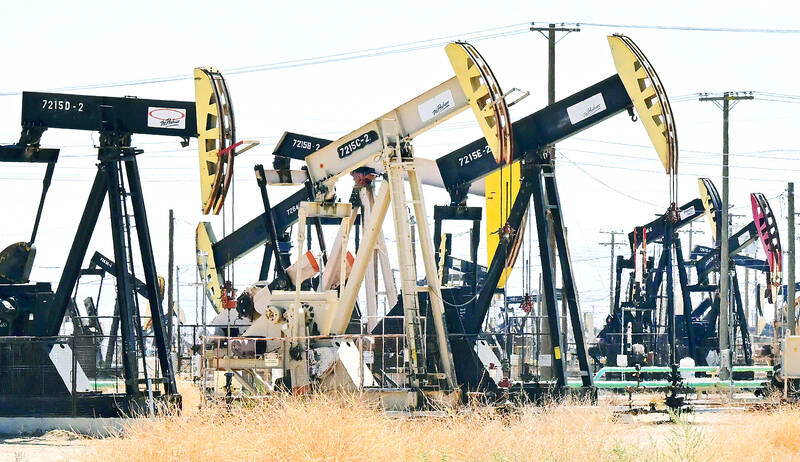US President Joe Biden yesterday was to announce that he would put the final 15 million barrels on the market from a record release of US strategic oil reserves, with more releases possible if fuel prices spike, a senior US official said on Tuesday.
The new tranche of oil from the Strategic Petroleum Reserve (SPR) would be “completing the 180 million barrel release authorized in the spring,” in response to price hikes linked to Russia’s invasion of Ukraine, the official said.
The order, which Biden was to announce in a speech, means the president would be “making clear that the administration is prepared to undertake significant additional ... sales this winter if they are needed due to Russian or other actions disrupting global markets,” the official said.

Photo: AFP
The decision to make the biggest ever dip into the emergency oil reserves — usually kept for responding to situations such as hurricane-related shutdowns at oil refineries — was Biden’s gambit to calm energy markets and shield the world’s biggest economy from Ukraine war shocks.
Major energy exporter Russia was hit with US and European sanctions soon after it invaded Ukraine in February, causing turmoil on markets.
In addition, the Kremlin has threatened to use its leverage over fuel supplies as an economic weapon against the West, which supports Ukraine’s fight to repel the invasion.
For Biden there are serious domestic concerns, with gasoline prices at one point averaging more than US$1.32 a liter, causing nationwide anger.
The official, who spoke on condition of anonymity, said that the Strategic Petroleum Reserve was not being used irresponsibly.
At the same time as announcing the 15 million barrel drawdown for delivery in December and flagging the possibility of more to come, Biden is highlighting a plan to refill the reserve as soon as prices hit about US$67 to US$72 a barrel, the official said.
This is “an important signal for producers that the SPR will be part of helping to moderate and stabilize price flows, not only when prices are going high, but when prices are going low,” he said.
The reserve remains in good shape, with more than 400 million barrels, the official said.
“That is still a large amount” and allows for “additional opportunity ... if we need to do more sales,” he said.
Asked whether the US could take the more radical measure of curbing fuel exports — something that would help tamp down domestic prices, but hurt foreign buyers, including in allied countries — an official declined to confirm or deny.
“We’re keeping all tools on the table,” said the second official, who also spoke on condition of anonymity.
Crude oil prices have rebounded this month after losing more than 20 percent last quarter as OPEC and its allies agreed on the biggest production cut since 2020.
OPEC+ defended its move, saying it was justified by the growing risk of a global recession, while Chinese oil demand is still in limbo amid COVID-19 lockdowns and concerns of a global economic slowdown.
West Texas Intermediate pared some gains after rising as much as 1.6 percent. Futures dropped 7 percent in the previous three sessions on the US attempts to tamp down prices.

Vincent Wei led fellow Singaporean farmers around an empty Malaysian plot, laying out plans for a greenhouse and rows of leafy vegetables. What he pitched was not just space for crops, but a lifeline for growers struggling to make ends meet in a city-state with high prices and little vacant land. The future agriculture hub is part of a joint special economic zone launched last year by the two neighbors, expected to cost US$123 million and produce 10,000 tonnes of fresh produce annually. It is attracting Singaporean farmers with promises of cheaper land, labor and energy just over the border.

US actor Matthew McConaughey has filed recordings of his image and voice with US patent authorities to protect them from unauthorized usage by artificial intelligence (AI) platforms, a representative said earlier this week. Several video clips and audio recordings were registered by the commercial arm of the Just Keep Livin’ Foundation, a non-profit created by the Oscar-winning actor and his wife, Camila, according to the US Patent and Trademark Office database. Many artists are increasingly concerned about the uncontrolled use of their image via generative AI since the rollout of ChatGPT and other AI-powered tools. Several US states have adopted

A proposed billionaires’ tax in California has ignited a political uproar in Silicon Valley, with tech titans threatening to leave the state while California Governor Gavin Newsom of the Democratic Party maneuvers to defeat a levy that he fears would lead to an exodus of wealth. A technology mecca, California has more billionaires than any other US state — a few hundred, by some estimates. About half its personal income tax revenue, a financial backbone in the nearly US$350 billion budget, comes from the top 1 percent of earners. A large healthcare union is attempting to place a proposal before

KEEPING UP: The acquisition of a cleanroom in Taiwan would enable Micron to increase production in a market where demand continues to outpace supply, a Micron official said Micron Technology Inc has signed a letter of intent to buy a fabrication site in Taiwan from Powerchip Semiconductor Manufacturing Corp (力積電) for US$1.8 billion to expand its production of memory chips. Micron would take control of the P5 site in Miaoli County’s Tongluo Township (銅鑼) and plans to ramp up DRAM production in phases after the transaction closes in the second quarter, the company said in a statement on Saturday. The acquisition includes an existing 12 inch fab cleanroom of 27,871m2 and would further position Micron to address growing global demand for memory solutions, the company said. Micron expects the transaction to